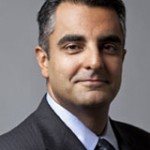Allianz SE, Europe’s largest insurer, said it is committed to bolstering operations in the U.S. after international rivals scaled back in the country.
“It is a monster market,” Gary Bhojwani, the management board member responsible for the Munich-based company’s U.S. insurance business said in an interview. “Clearly we need to have a presence here.”
Allianz’s Fireman’s Fund is being more selective after poor results in lines like workers’ compensation and crop coverage, Bhojwani said. The commercial unit is targeting 17 industry areas including hospitals and entertainment.
Allianz accounted for about 1 percent of the U.S. property-casualty market in 2012, compared with 10 percent at State Farm Mutual Automobile Insurance Co. and 5.5 percent at Zurich Insurance Group AG.

“For the world’s No. 1 property-and-casualty group to have this small a position is not that satisfying,” Bhojwani said in the Nov. 11 phone interview. “The right way to do it is, first fix what we have and then we can talk about expansion.”
That approach contrasts with life insurers like London- based Aviva Plc, Canada’s Sun Life Financial Inc. and ING Groep NV, the largest Dutch financial-services company, which have been divesting U.S. units that provide retirement products. The German insurer’s mix of businesses helped it weather economic slumps and cushion past missteps in the U.S., the world’s largest insurance market, said Bhojwani, 45.
Fireman’s Fund
He oversees the Fireman’s Fund unit that the German company acquired in 1991 and Allianz Life Insurance Co. of North America. Bhojwani joined Allianz’s board in 2012 after being chief executive officer of the U.S. life unit from 2007 to 2011. He previously ran the commercial business at Novato, California- based Fireman’s Fund.
Allianz, led by CEO Michael Diekmann, also owns Pacific Investment Management Co., the world’s largest fixed-income manager, and a global corporate and specialty commercial insurance unit. While both operate in the U.S., Bhojwani doesn’t oversee them.
The U.S. life business, now led by CEO Walter White, recorded losses in 2008 tied to annuity guarantees when stocks crashed, and Allianz pulled some products and redesigned others. The unit has since posted operating profits for four straight calendar years.
Investors have been increasingly willing to bet on companies that provide retirement products as stock markets climb. Aviva last month completed the sale of its U.S. life unit to Apollo Global Management LLC for $2.6 billion.
The divestiture helps the London-based company simplify its business and strengthen its financial position, CEO Mark Wilson said in a statement last month. Aviva still has an investment management unit in the U.S.
‘Holy Cow’
ING Groep has been cutting its stake in a U.S. business through public offerings and will eventually exit the unit under terms of its bailout. New York-based ING U.S. Inc., which will be renamed Voya Financial, has rallied 83 percent since its initial public offering in May.
Bhojwani said an aging population and the decline of traditional pension plans make the U.S. retirement business attractive. His company was the No. 3 seller in the first half of this year in fixed annuities, which can offer payouts at a set rate or tied to an index, while limiting a saver’s risk if markets fall.
“All the circumstances are there for these products that offer guaranteed income to have a resurgence,” Bhojwani said. “You will see more and more people, as they approach retirement, say, ‘Holy cow, I’m not so worried about growing my nest egg anymore. I’ve got to shift and think about how to guarantee the income.'”
Prudential, Axa
Prudential Plc CEO Tidjane Thiam yesterday affirmed the commitment of his London-based company to its Jackson National Life, the largest seller of annuities in the U.S. The business helps diversify earnings, he said on a conference call with reporters.
“We are very happy with the U.S. business,” he said. “It has a great future in the group.”
Axa SA, Europe’s second-largest insurer, is also working to expand in the U.S., betting it can benefit from a wave of baby boomers exiting the workforce, CEO Henri de Castries said in September. The Paris-based insurer offers life insurance, retirement products and investment management in the U.S.
With more than $1.2 trillion in premiums in 2012, the U.S. is the biggest market for both property-casualty and life-health coverage, according to data compiled by Swiss Re Ltd. Japan is No. 2, with about $654 billion. Allianz offers coverage in more than 70 countries, and counts Germany and Western Europe among its largest markets.
Asbestos, Crops
Allianz shares have gained 22 percent this year. That compares with a 24 percent increase for the 30-company Bloomberg Europe 500 Insurance Index.
Fireman’s Fund, which named Andrew Torrance CEO this year, has had to strengthen reserves for rising risks related to asbestos and other long-lived liabilities on commercial policies. In the consumer business, the insurer is focusing on high net worth individuals by protecting homes, yachts, fine art and wine collections.

Allianz reported a 60 percent decline in third-quarter property-casualty policy sales in the U.S. as the company reduced crop coverage following a drought last year that was the worst in the U.S. in at least two decades. Expenses represented 29.8 percent of premiums, up from 21.8 percent a year ago.
Bringing the expense ratio down to the year-ago level, when Fireman’s Fund wrote more crop business, “is a very big hill to climb,” Bhojwani said. “The expenses are still too high, the dollars need to continue to stabilize or come down depending on what happens with premiums.”
Criticism Accepted
The U.S. division reported an operating profit of 37 million euros ($50 million) in the third quarter, compared with a loss of 247 million euros a year ago, as claims costs fell. Fireman’s Fund is on track to report an operating profit this year and expects to post an underwriting profit in 2014, Bhojwani said. The unit is limiting risks in catastrophe-prone regions and segments in which liabilities can emerge years after policies are sold.
“People can point to Fireman’s Fund and other things and be very critical of us, appropriately so,” Bhojwani said. “We’ve made a lot of mistakes,” he said. “There are things we could do better.”
–With assistance from Sarah Jones in London. Editors: Dan Kraut, Frank Connelly





















 Experts Say It’s Difficult to Tie AI to Layoffs
Experts Say It’s Difficult to Tie AI to Layoffs  Allianz Built an AI Agent to Train Claims Professionals in Virtual Reality
Allianz Built an AI Agent to Train Claims Professionals in Virtual Reality  Winter Storm Fern to Cost $4B to $6.7B in Insured Losses: KCC, Verisk
Winter Storm Fern to Cost $4B to $6.7B in Insured Losses: KCC, Verisk  Nearly 26.2M Workers Are Expected to Miss Work on Super Bowl Monday
Nearly 26.2M Workers Are Expected to Miss Work on Super Bowl Monday 





